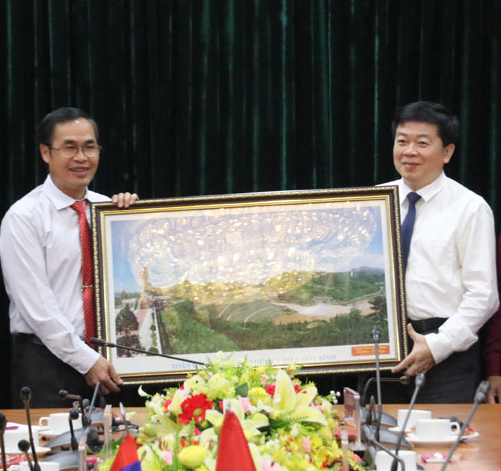
(HBO) – A working delegation from the Lao province of Houaphan led by Vice Governor Phusone Thammavisay paid a working trip to the northern province of Hoa Binh. Vice Chairman of the provincial People’s Committee Nguyen Van Chuong received and held a working session.
At the working session, both sides discussed
issues of shared concern, especially those in agriculture, forestry and rural
development, and socio-economic performance in the recent past.
The Vice Governor of Houaphan expressed his
delight at the warm welcome given by the provincial authorities. He suggested
that Hoa Binh offer continued support to Houaphan in workforce training, send
businesses to the Lao province for field survey and conduct exchanges to share
experience.
Vice Chairman of the provincial People’s
Committee Nguyen Van Chuong welcomed the Lao delegation to the province. He
spoke highly of achievements made by the two countries in general and the two provinces in particular
in economy, politics, socio-culture. He wished that the two localities would
foster sustainable partnership in agriculture, thereby strengthening Vietnam –
Laos special friendship, as well as friendship between the two provinces, thus gradually
lifting bilateral ties to a greater height.
On behalf of the provincial authorities,
Vice Chairman of the provincial People’s Committee Nguyen Van Chuong presents a
picture of Uncle Ho at Hoa Binh hydropower plant to the Lao delegation.
Phusone Thammavisay wished Chuong and leaders of
Hoa Binh province’s departments and agencies good health, and friendship and
cooperation between the two nations everlasting growth.
On October 17, the delegation visited an
irrigation system for agriculture, a fruit cultivation area and a chicken farm
in the locality./.
Hoa Binh province is undergoing a dynamic transformation amid Vietnam’s national digital transition. Building on Poliburo’s Resolution No. 57-NQ/TW on breakthroughs in science, technology, innovation, and national digital transformation, the province has rolled out a wide range of practical action plans. A standout initiative is the "Digital Literacy for All” movement, an effort to ensure that no one is left behind in the digital era.
Hoa Binh province is undergoing a dynamic transformation in the wake of the national digital transformation movement. Building on Resolution No. 57-NQ/TW of the Politburo on breakthroughs in science, technology, innovation, and national digital transformation, the province has implemented a wide range of practical action plans. A standout initiative is the "Digital Literacy for All” movement ambitious effort to ensure that no one is left behind in the digital age.
With a spirit of unity and proactive problem-solving, the Party Committee, the government and the people of Dong Lai Commune (Tan Lac District) have made great strides in implementing the resolutions of the 24th Party Congress of the commune for the 2020 - 2025 term. Focusing on leadership and practical actions, the commune has brought the Party’s resolutions into daily life, creating strong impacts and pushing the local development forward.
Amid the nationwide push for digital transformation, young people in Hoa Binh Province are stepping up as dynamic pioneers, applying technology to enhance Youth Union operations and expand the reach of youth-led initiatives. Through creativity and adaptability, Youth Union organizations at all levels have introduced a series of practical solutions, contributing to modern governance and community development.
In recent years, An Nghia commune, located in Lac Son district, has stepped up administrative reform, focusing on improving the quality and efficiency of its single-window service unit for receiving and processing administrative procedures. These improvements have helped create favourable conditions for local residents and organisations to handle administrative procedures, contributing to the commune’s broader socio-economic development.
The Prime Minister-approved master plan to develop the multi-use value of forests ecosystems through 2030, with a vision to 2050, aims to improve the management and sustainable use of forest resources, create jobs, increase incomes, and improve the living standards of ethnic minorities, people in mountainous and remote areas, forest workers and those living near forests.



